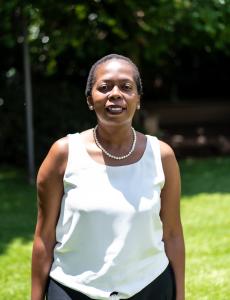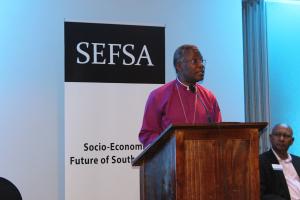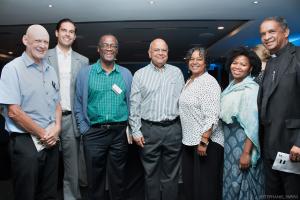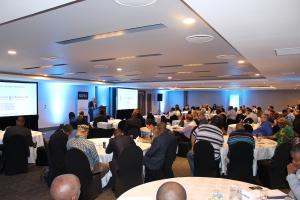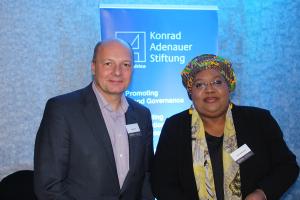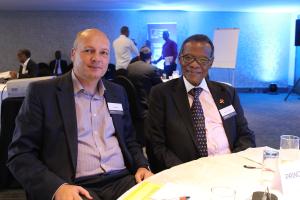Expert conference
Details
The inaugural SEFSA (Socio-Economic Future of South Africa) summit which took place on 11 and 12 March was convened by Archbishop Thabo Makgoba. The two day summit was attended by politicians, business leaders, members of the faith community and civil society in general. Minister of Finance Parvin Gordhan was one of the speakers, others include Rev Frank Chikane, former COSATU secretary general Zwelinzima Vavi, CEO of the Johannesburg Stock Exchange (JSE) Nicky Newton-King, IFP leader Prince Mangosutho Buthelezi and many others.
The purpose of the summit was to provide direction, engagement and feedback on securing a peaceful, prosperous and inclusive future for South Africa in relation to good governance and accountability, job creation and economic growth, moral regeneration, combating corruption and social stability.
Summary
Over 100 leaders representing a cross section of South African society responded to the invitation by Anglican Archbishop Thabo Makgoba to attend an urgent inaugural two day summit (11 & 12 March 2016) held in Johannesburg. The purpose was to discuss the Socio-Economic Future of South Africa (SEFSA) - indeed the name of the initiative.
Four observations:
Among the many lessons and “take-a-ways” from the summit there are at least four observations I would like to highlight.
The first observation is that the SEFSA summit proved we could pull together leaders from across the ideological and experiential spectrum and constructively discuss the challenges facing our society. We had over 100 leaders moving through the summit with some only attending either Friday or Saturday due to other commitments.
The second observation is drawn from the Archbishop’s opening speech which contextualised the growing trust deficit that bedevils the body politic of South African society. The Archbishop went on to explain why it was important to activate an initiative such as SEFSA and its stated intention of creating a safe and trusted platform (i.e. a conducive space) for leaders to engage and hold each other accountable.
The third observation is the emerging consensus regarding the need to show solidarity with honourable leaders from across all sectors of society, with special reference to those in the public service. A point often made during the summit was that there are more good people than bad in South Africa. We must therefore not be held hostage by a minority who seeks to undermine the foundations of our democratic society.
The fourth observation relates to the summit process itself and the role of the guest speakers. The process was designed to stimulate group discussion and break the traditional silos that we inhabit by default. The summit process achieved this goal with the stimulating input from various guest speakers.
Nicky Newton-King, CEO of the JSE, shared her reflections from a business perspective with insights from her recent meetings while accompanying Minister Gordhan to rating agencies in London and the USA, just two days earlier. Shaeera Kalla, a Wits University student, provided a perspective with reference to the “fees must fall” campaign and related challenges facing the youth. Frank Chikane shared a personal perspective on how circumstances change people. Zwelinzima Vavi drew attention to the miracle namely that the country is not in flames or revolutionary battle given the statistics around youth unemployment. Prince Mangosotho Buthelezi provided an elder statesman and calm affirmation for SEFSA. The Chief Rabbi, during a joint media interview with Archbishop Makgoba provided overt endorsement for the SEFSA initiative. Moulana Bham representing the National Religious Leaders Forum provided the summit a perspective on the consequences, at a community level, of the lapse in ethical leadership and values. Indigenous leader Oom Petrus Vaalbooi, representing the Kalahari Bushmen people, made an impassioned plea to pay attention to Khoisan challenges. David Lewis of Corruption Watch provided a context for understanding the fight against corruption and why it was important to rally around leaders such as Pravin Gordhan. Mark Heywood provided a context in which to understand and interpret how we are falling short of the constitutional imperatives and obligations which should underpin our society. Ann Bernstein shared her thoughts on mass employment and inclusion as a precursor to the soon to be released report in this regard.
The creation of a safe space
I admit to being moved to tears during certain sessions. Some presentations and discussions were just so deeply moving. I have heard from others that they were similarly moved.
The summit created a safe space where leaders could get in touch with their own vulnerability outside of the glare of the media cameras. In that regard the summit was special.
The Archbishop’s oration at the start of the summit was prophetic in orientation. His closing remarks and subsequent media statement was priestly/pastoral in orientation, exhorting the summit to hold fast and to be strong as we enter a difficult period in the country.
Way forward
The summit concluded on an “open-ended” note with neither decisive nor clear “next steps” save to say that more such engagements are necessary. In this regard, SEFSA’s 5-year outlook and commitment has begun to make sense. South Africans face a tough road ahead as we all do our bit in our corner to fix the country.
Next summit: It is evident that there is both value and a need for smaller scale summits at both a national and provincial level. These “smaller” dialogues/summits will form part of a build up to a larger national gathering which we hope to host annually over the next 5 years.
Socio-Economics toolkit: The SEFSA leadership is currently discussing creative ways to empower SEFSA delegates (members!!) with a “socio-economic toolkit” so that we know how to pray, prepare and interpret the looming economic meltdown as well as reinvigorate the economy on a mass scale. The immediate question that everyone should be asking is: “What does a downgrade mean and what are the consequences for the constituencies represented at the summit? In this regard you will receive further notices.
SEFSA leadership: The justified critique by summit delegates is that the leadership of SEFSA is too male and old. Of course, there is a link between age and wisdom which we will not debate here. We were conscious of the representation challenge going into the summit. Our excuse was that the Archbishop put us under pressure to get out of the starting blocks and fix things as we move along. It is now time to fix the glaring representation deficiency both at the level of patrons and steercom.
Conclusion
The rush and pressure to deliver the inaugural summit is over. A different kind of pressure is likely to consume SEFSA relating to the looming downgrade and attempts on the part of people like Pravin Gordhan and Team South Africa to stave off what some say is the inevitable.
SEFSA will need to be vigilant and responsive in what promises to be tumultuous days (and possibly years) ahead. In this regard we will appreciate your ongoing support and encouragement.
We will soon communicate in more detail regarding how you can become a more involved in SEFSA and how you can and should create your own SEFSA support and membership group in your area.
Once again thanks for your support and commitment.
Report written by Ruben Richards



